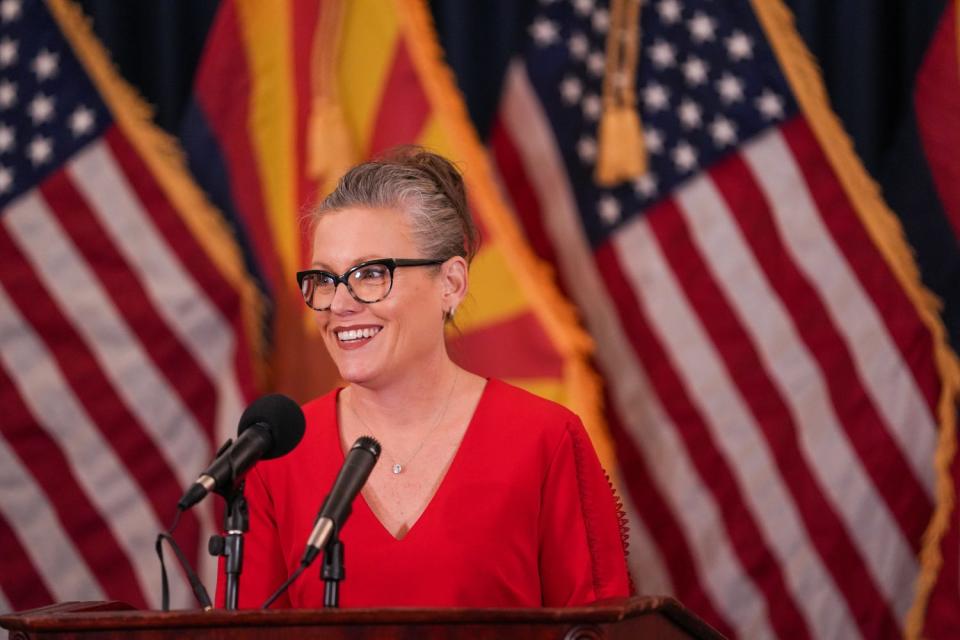As lawmakers return to Arizona Capitol, ending apartment rental tax becomes a bargaining chip
- Oops!Something went wrong.Please try again later.
A bill passed in June to repeal rental tax in Arizona was withheld from Gov. Katie Hobbs and is now a bargaining chip in negotiations for the Proposition 400 transportation tax renewal as lawmakers return to the Capitol Monday.
The tactic appears to conflict with a 2009 state Supreme Court ruling that said the Legislature must send bills it passes to the governor "with no more delay than is reasonably necessary to complete any ministerial tasks and otherwise effect their orderly transmittal."
Hobbs never demanded to receive the bill, which passed the Legislature on June 13. Though she vetoed an earlier version of the bill in February, the new one is part of a potential deal on Proposition 400, according to real estate lobbyist Tom Farley, who supports the tax repeal.
"The rental tax repeal and Prop. 400 have to travel together," said Farley, who represents the Arizona Association of Realtors. He added that even if Proposition 400 is a no-go, he's pretty confident Hobbs will sign the rental tax repeal. "Our goal is to get the bill passed this year with or without Prop. 400."
How rental tax, transportation tax could be part of bargain

The transportation tax renewal, supported by Hobbs, the Maricopa Association of Governments and cities including Phoenix, would go on the 2024 ballot if lawmakers reach an agreement with Hobbs. If voters approve the renewal of Proposition 400, it would continue a half-cent tax in Maricopa County and provide billions of dollars in transportation needs including new roads and upgraded public transit.
City and county leaders say its passage is crucial to metro Phoenix's future economy.
Republican lawmakers, however, are critical of the Valley's light-rail system and have fought against the tax. They sent a Proposition 400 extension to Hobbs last month that would have put two measures on the ballot, one solely to fund light rail and the other to pay for roads. Hobbs vetoed it.
But hopes among supporters remain high that a new Proposition 400 deal could happen July 31 or Aug. 1, when lawmakers return from a long break to work for an expected two days before ending this year's session.
The rental tax repeal bill, sponsored by Senate President Warren Petersen, could help by offering Republicans something they want in return for approving a version of a Proposition 400 extension that Hobbs would sign.
The latest version of the rental tax repeal contains new features, including changing the start date from January 2024 to January 2025. It not only bans cities and towns from levying the tax but makes landlords responsible for lowering rent by the amount of the tax until 2027. Seventy Arizona municipalities tax rent, including Phoenix, Scottsdale, Tempe, Peoria, Glendale and Gilbert.
The powerful League of Arizona Cities and Towns supports a Proposition 400 extension but has opposed both versions of the rental tax repeal, saying that cities and towns need the revenue.
"We don't think these are issues that should be linked together," said Tom Savage, the league's legislative liaison.
While the rental tax is an "important source of revenue" for some cities and towns, Proposition 400 is "very important in terms of building a vital transportation network," he said.
What Supreme Court said about bills going to governor
Failing to transmit a bill to the governor soon after it is passed is not allowed, though, the state Supreme Court said in 2009. That year, the Legislature refused to send a raft of appropriations bills to then-Gov. Jan Brewer, who had announced she would veto them. Brewer took the lawmakers to court 11 days later.
Now-retired Justice Scott Bales, the court's chief justice at the time, ruled that the state Constitution requires the immediate transmission of a passed bill to the Governor's Office, and requires the Legislature to "present such bills to the governor with no more delay than is reasonably necessary to complete any ministerial tasks and otherwise effect their orderly transmittal."
Bales didn't order the lawmakers to send the appropriations bills back then, however, since the Legislature didn't previously have a guiding standard.
Hobbs could demand the rental tax repeal bill based on the 2009 ruling, but has not. Christian Slater, Hobbs' spokesman, said the governor has no comment on the negotiations or why she hasn't asked lawmakers to send the rental tax repeal bill to her.
Petersen said Hobbs would receive it when the Legislature resumes on July 31. Neither Petersen nor House Speaker Ben Toma would comment on the delay in sending the bill to Hobbs or whether any progress had been made in Proposition 400 talks.
Reach the reporter at rstern@arizonarepublic.com or 480-276-3237. Follow him on Twitter @raystern.
This article originally appeared on Arizona Republic: Why repealing a tax on apartment renters has lingered at Ariz. Capitol

